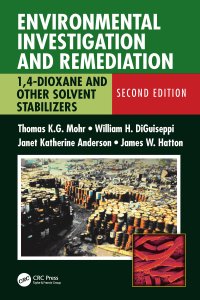
Ebook: Environmental Investigation and Remediation-1,4-Dioxane and other Solvent Stabilizers, Second Edition
Author: Thomas K.G. Mohr (Author), William H. DiGuiseppi (Author), James W. Hatton (Author), Janet Katherine Anderson (Author)
- Year: 2020
- Publisher: CRC Press
- City: Boca Raton
- Edition: 2
- pdf
Filled with updated information, equations, tables, figures, and citations, Environmental Investigation and Remediation: 1,4-Dioxane and Other Solvent Stabilizers, Second Edition provides the full range of information on 1,4-dioxane. It offers passive and active remediation strategies and treatment technologies for 1,4-dioxane in groundwater and provides the technical resources to help readers choose the best methods for their particular situation. This new edition includes all new information on remediation costs and reflects the latest research in the field. It includes new practical case studies to illustrate the concepts presented, including 1,4-dioxane occurrence in Long Island and the Cape Fear watershed in North Carolina.
Features:
- Fully updated throughout to reflect the most recent research on 1,4-dioxane
- Describes the nature and extent of 1,4-dioxane releases, their regulation, and their remediation in a variety of geologic settings
- Examines 1,4-dioxane analytical chemistry, its many industrial uses, and 1,4-dioxane occurrence as a byproduct in production of many products
- Provides ample site data for recent and relevant remediation case studies, and a review of the widely varying regulatory landscape for 1,4-dioxane cleanup levels and drinking water limits
- Discusses the importance of accounting for contaminant archeology in investigating contaminated sites, and leveraging solvent stabilizers in forensic investigations
While written primarily for practicing professionals, such as environmental consultants and attorneys, water utility engineers, and laboratory managers, the book will also appeal to researchers and academics as well. This new edition serves as a highly useful reference on the occurrence, sampling and analysis, and remedial investigation and design for 1,4-dioxane and related contaminants.